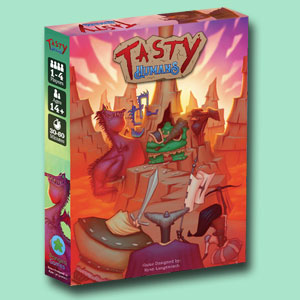Over the last couple of weeks of Behind the Scenes: Lessons from a Kickstarter Board Game Publisher, I’ve talked about some of the strange goings-on I’ve noticed in the board game industry. I’ve talked about why People are Weird, Markets are Weirder…Especially with Board Games and Why Board Game Publishers Like Some Games and Don’t Like Others. Today, we’re going to talk about the tabletop gaming news cycle, and why it is – frankly – just plain weird.
Need help on your board game?
Looking for more resources to help you on your board game design journey?
There’s nothing conspiratorial here. There’s no grand machination orchestrated by shadowy figures. There are, however, definitely weirdo group dynamics that are exacerbated by the technological advances of our era, namely search engines, social media, and an unending deluge of data. Nowhere are these weird group dynamics more obvious than in the tabletop gaming news cycle.

People Are Weird. So are their media consumption habits.
In People are Weird, I stated that “gamers are becoming ever more sophisticated in ways to narrow down what they’d like to buy. No human being, let alone a busy one with a family or work or friends, could analyze every game to see what looks like ‘the best idea.’ Gamers do what any rational person would do in this situation – take mental shortcuts to make snap decisions.”
Turns out, people do the same thing with news, too. Left to our own devices, we gravitate toward news sources that act as comfort food for our mind. Google, Facebook, Amazon, and every Silicon Valley website out there that uses algorithms and automation to curate your experience only further serves to make you dangerously comfortable. Your Facebook feed shows you political news that enforces your current beliefs. Amazon suggests you buy items that resemble what you’ve bought before. Google tweaks your results based on what you click.
Good media outlets understand people. They help create the tabletop gaming news cycle.
Now in board games, thankfully, this effect is more innocuous. Curators of board game news, no matter who they are, have a vested interest in getting more views. They either want to display ads, sell merch, push their games, or take donations. This is true even for people who just want to pay the web maintenance bills. However, to get traffic, you have to talk about things that people are already reading about. You have to go through Google, social media, and Board Game Geek to find out where the hype is. The most successful websites create valuable content, yes, but they also by necessity have to be masters at the web traffic game. They know how to use the right keywords and buzzwords to follow the trends.
Websites need clicks, search engines need to work effectively, and gamers want to stay informed. At every level of the tabletop gaming news cycle, from the news-makers to the curators (search engines) to the readers, the incentive structure forces articles into saying the same thing repeatedly. That’s why there are a billion reviews of Azul online. That’s why gaming news has the general malaise of sameness after a while.
Social media follows the same rules.
“Okay, so I’ll just turn to social media and forums instead,” you might say. Facebook, Twitter, Instagram, Pinterest, Reddit, and Board Game Geek can all provide alternative viewpoints to published websites. It is, after all, user-generated content. You would think that this would counterbalance the sameness of the larger tabletop gaming news cycle, but this is not the case either.
Every social media site and every forum worth its salt has some way of sorting. Social media sorts popular posts and prioritizes their position in the feed so more people see them. Reddit uses upvotes and downvotes, which – whether you admit it to yourself or not – colors the way you perceive the comment that follows. Board Game Geek has more complicated version of that which effectively does the same thing, involving Geek Gold, badges, a points system, and probably twenty other features that I still haven’t learned about after a few years of using the site. The incentive structure still exists.
Imagine, for a moment, a truly egalitarian website where there was no sorting, except for purely chronological and there were no upvotes or downvotes. Even in a place like that, there would still be “right” and “wrong” answers based on what people are expected to say. People are expected to conform to certain patterns, to like certain games, and say certain things. You follow the pattern, people praise you. You don’t follow the pattern, people think you’re weird. This is neither good nor bad, it simply is.
It’s not going to change.
At every level of news sourcing for any industry, including board games, there are incentives to say the same thing over and over. There are incentives to praise specific games and specific types of games. I don’t see a way around this or a way to change it. In fact, I even covered this a long time ago in The Board Game Industry: Powers That Be & The Hype Machine.
I’m loath to leave you on such a sour note, so I will conclude with five recommendations for new creators who want to make board games:
- Figure out what kind of games people like to play, then make that but with your own spin.
- Work in a team with other talented people.
- While working in a team, work on more than one game at once.
- Accept the weirdness of people, markets, and news cycles.
- Reach out to players directly.
Remember you’re a part of a bigger picture. Creative work can be very difficult and it can seem unbelievably difficult to get attention online. Stay strong, keep creating good work, work with talented people, and keep trying! You’ve got one supporter already 🙂




